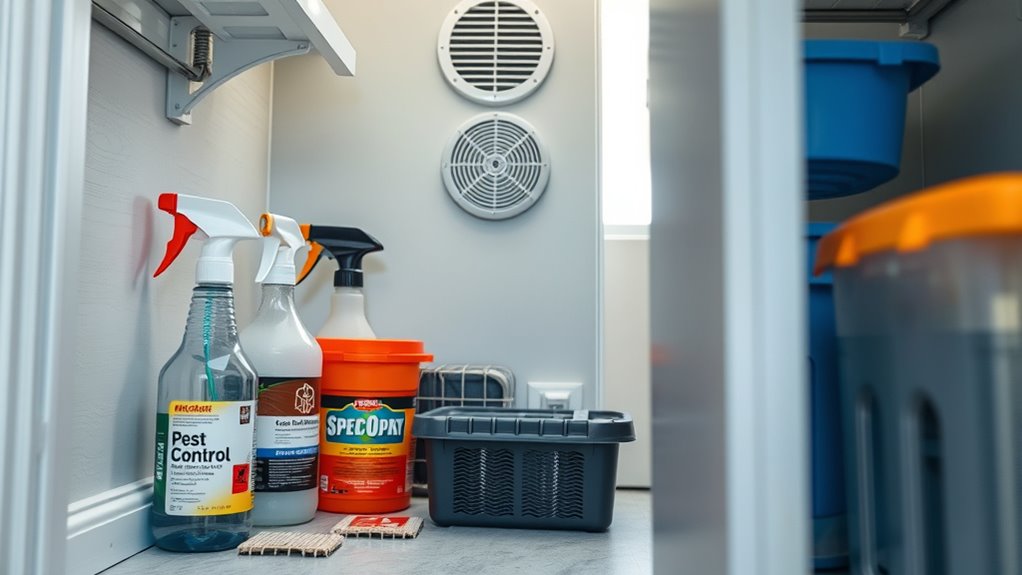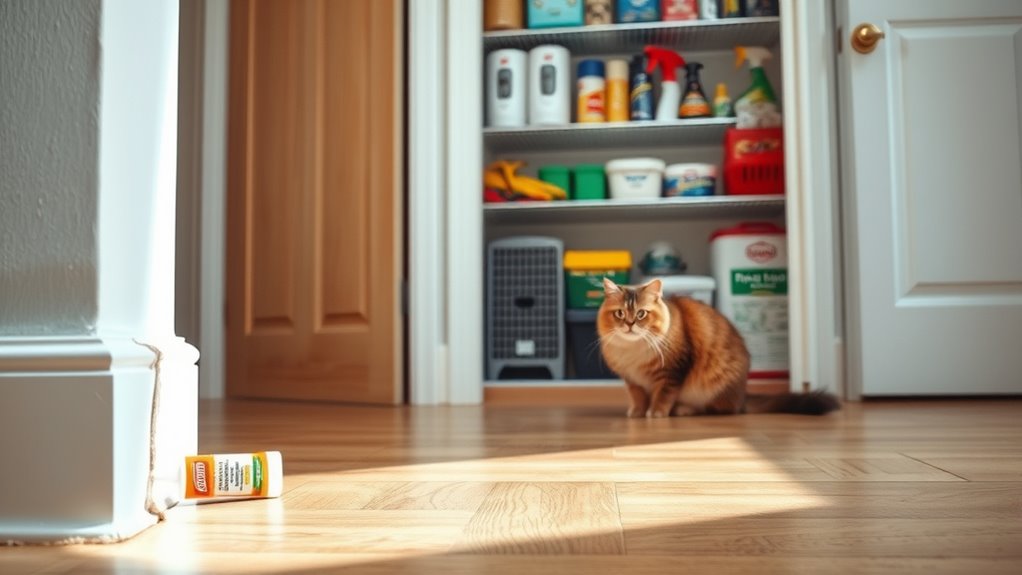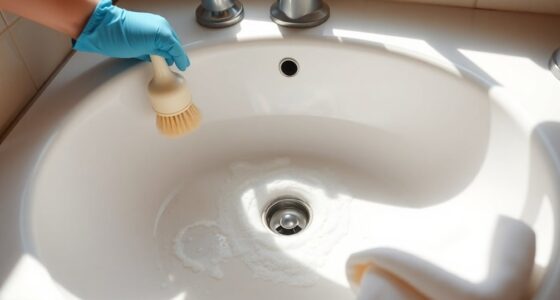To keep bugs and rodents out of your home, focus on sealing cracks and gaps around windows, doors, and the foundation with caulk or weatherstripping. Use door sweeps, mesh screens, and vents covers to block entry points. Maintain a clean, clutter-free environment, trim bushes, and store trash properly. Installing physical barriers and using natural repellents like peppermint oil help deter pests. Keep up with regular inspections and maintenance to stay pest-free—more tips await to help you protect your home effectively.
Key Takeaways
- Seal cracks, gaps, and entry points around windows, doors, and foundations to block pests from entering.
- Install physical barriers like door sweeps, mesh screens, and vent covers to prevent pest access.
- Use natural repellents such as peppermint oil, vinegar, and diatomaceous earth to deter bugs and rodents.
- Maintain cleanliness and remove clutter to eliminate food sources and hiding spots for pests.
- Regularly inspect and repair exterior seals and barriers, and monitor pest activity to catch issues early.

Have you ever wondered how to effectively keep pests out of your home? The key lies in understanding simple yet effective pest prevention strategies that you can implement yourself. DIY remedies can be surprisingly effective when used correctly, especially if you combine them with pest prevention tools designed to block pests from entering. Starting with your home’s exterior, sealing cracks and gaps around windows, doors, and foundations is essential. Use caulk or weatherstripping to close off entry points that pests might exploit. These small steps can make a big difference in preventing bugs and rodents from finding their way inside.
In addition to sealing, investing in pest prevention tools can give you a notably advantage. Installing door sweeps on exterior doors, sealing vents, and repairing screens on windows help create physical barriers. These tools are easy to install and provide ongoing protection. You might also consider using door draft stoppers or mesh screens over vents. By blocking these access points, you’re making it harder for pests to invade your space, reducing the need for more invasive control methods later.
When it comes to DIY remedies, natural repellents are popular choices that many homeowners find effective. For example, peppermint oil is known to repel mice and ants. Soak cotton balls in peppermint oil and place them near entry points or areas where pests tend to gather. Vinegar solutions, lemon juice, or even diatomaceous earth can also deter pests without chemicals, making them safe options for households with children or pets. Regularly cleaning and decluttering your home removes food sources and hiding spots, which is often enough to keep pests at bay. Additionally, incorporating recycled products into pest control strategies can reduce environmental impact and enhance your efforts.
Using integrated pest management techniques such as combining DIY remedies with physical barriers creates a more comprehensive approach. For instance, setting up traps or bait stations around the perimeter can catch pests before they reach your living spaces. Maintaining outdoor areas by trimming bushes and keeping trash bins sealed also helps reduce attractants. Properly using air purifier features like HEPA filters can improve indoor air quality by reducing airborne allergens and odors that attract pests or cause discomfort. Moreover, exploring remote hackathons and other innovative community-driven solutions can inspire new methods for pest control, leveraging technology and collective knowledge. Incorporating monitoring systems can also help detect pest activity early, preventing larger infestations. Remember, consistency is key—regular inspections and maintenance prevent pests from establishing a foothold.
Ultimately, the goal is to create an environment that’s unappealing for pests while making it difficult for them to get inside. By combining DIY remedies, pest prevention tools, and good housekeeping habits, you can considerably reduce your chances of dealing with infestations. Staying vigilant and proactive not only saves you money but also spares you the frustration of dealing with pests later. Small, consistent efforts go a long way in keeping bugs and rodents out of your home, giving you peace of mind and a pest-free living space.

M-D Building Products 68247 All Season Aluminum Door Sweep for Bottom of Door, Heavy Duty Rubber Seal, Exterior & Interior Weather Stripping Bottom Door Seal, Commercial & Residential, (Silver, 36in)
Durable Heavy-Duty Build: Heavy-duty aluminum door sweep with thick single-fin rubber door sweep. UL-94HB rated seal resists damage…
As an affiliate, we earn on qualifying purchases.
As an affiliate, we earn on qualifying purchases.
Frequently Asked Questions
How Often Should I Schedule Professional Pest Inspections?
You should consider scheduling professional pest inspections based on your home’s inspection frequency needs and seasonal scheduling. Typically, it’s wise to have an inspection once a year, but if you’re in an area prone to pests or notice signs of trouble, more frequent visits—such as biannual or quarterly—are recommended. Regular inspections help catch issues early, ensuring your home stays pest-free, especially during peak pest seasons.
Are Eco-Friendly Pest Control Options Effective?
Eco-friendly pest control options can be quite effective if you use natural repellents and biological control methods. Natural repellents, like essential oils, deter pests without chemicals, while biological control introduces natural predators to manage infestations. You should combine these approaches with good sanitation and sealing entry points for best results. While they might take longer than chemical treatments, eco-friendly options are safer for your family and the environment.
What Are Early Signs of a Rodent Infestation?
Think of your home as a fortress; early signs of a rodent invasion are like silent alarms. You might notice tiny rodent droppings or hear unusual noises like scratching or scurrying, especially at night. These clues signal that uninvited guests have entered. Spotting these signs early helps you act swiftly, preventing a full-blown infestation and protecting your sanctuary from these unwelcome intruders.
How Do I Prevent Pests During Seasonal Changes?
During seasonal changes, you should stay vigilant about seasonal pest variations and weather-related pest control. To prevent pests, seal cracks and gaps around your home, remove standing water, and keep food stored securely. Adjust your pest control routines based on the weather, like increasing outdoor yard maintenance in spring and fall. Regularly inspect your home for signs of pests and consider professional treatments if needed, especially during peak pest seasons.
Can DIY Methods Completely Eliminate Pest Problems?
Did you know that 30% of DIY pest control efforts fail within three months? DIY methods might seem tempting, but they often have limitations, especially in reaching hidden pests or addressing root causes. While DIY can reduce pests temporarily, it rarely guarantees complete elimination. Pest recurrence is common without professional treatment, so for long-term results, investing in expert help is usually more effective than relying solely on DIY solutions.

Valchoose 4PACK Stainless Steel Woven Wire Mesh Never Rust, Air Vent Mesh 11.8"X8.2"(300X 210mm), Hard and Heat Resisting Screen, 1mm Hole 20 Mesh Easy to Cut for Rodents Filters Window DIY Projects
Professional Precision Structure – Stainless steel screen is woven by imported machines, with uniform mesh size and good…
As an affiliate, we earn on qualifying purchases.
As an affiliate, we earn on qualifying purchases.
Conclusion
By mastering these pest control basics, you hold the keys to your home’s fortress. Think of your space as a delicate garden—your vigilance and proactive steps are the nourishing sun and sturdy fence that keep unwanted invaders at bay. With consistent effort, you turn your home into a sanctuary, where pests can’t breach the walls. Remember, a vigilant gardener tends best, ensuring your haven remains bug-free and welcoming for years to come.

Mighty Mint Peppermint Oil Rodent Repellent Spray with Microfiber Cloth – Natural Indoor & Outdoor Control for Mice and Rats – Plant-Based, Extra-Strong Formula – 1 Gallon (128 oz)
Pet-Friendly & Family-Safe Formula – Mighty Mint is a top pick for pet parents looking for a natural…
As an affiliate, we earn on qualifying purchases.
As an affiliate, we earn on qualifying purchases.

M-D Building Products Replaceable Caulk Cord Weatherseal: Quick and Effective Solution for Sealing Small Gaps, Cracks, and Protecting Against Drafts and Moisture (71505) (White) (30 ft)
Versatile Sealing for Cracks and Gaps: Ideal for sealing cracks around windows, door frames, and plumbing this weatherseal…
As an affiliate, we earn on qualifying purchases.
As an affiliate, we earn on qualifying purchases.









